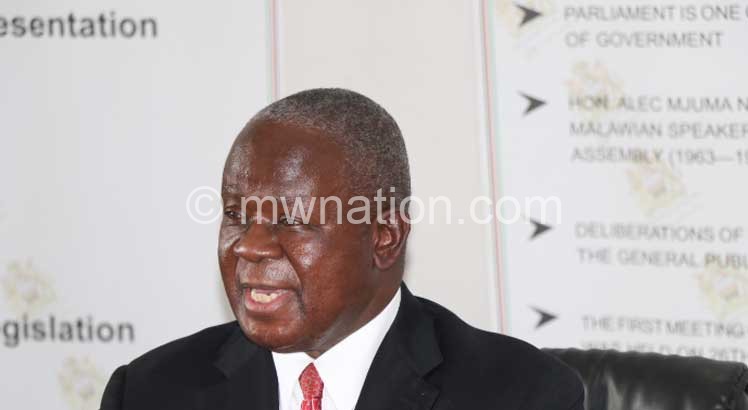Mlusu unveils K1.9tn second Tonse budget
Finance Minister Felix Mlusu yesterday presented a K1.99 trillion 2021/22 National Budget that attempts to deliver the Tonse Alliance campaign promises while aligning with the country’s aspirations contained in the Malawi 2063 Vision.
The 70-year-old government purse-keeper made some voters smile with tax cuts for beer; low income earners, introduction of a duty-free week for importers and the State’s intention to make free electricity and water connection a reality.
Oozing with confidence and wearing a brave face, Mlusu also dangled a myriad of tax and non-tax incentives to the private sector in the hope that the measures will harness the country’s economic recovery amid Covid-19 pandemic.
The new budget, framed at the height of subdued economic activity, also signals to sustain the progress on economic reforms that were announced in the 2020/21 National Budget, which expires on June 30 2021.

The icing on the budget is that it is the first to take on board Malawi (MW) 2063 Vision, a move National Planning Commission (NPC) director general Thomas Munthali highly commended yesterday.
“The minister [Mlusu] kept referring to how the various components of the budget are linking to the MW2063 pillars and enablers and was specific on which ones,” he said.
The new financial plan, which will run for nine months—from July 2021 to March 2022—due to the change in the country’s fiscal plan, also appears to respond to the much-needed economic recovery.
The budget further responds to President Lazarus Chakwera’s national near-term priorities of wealth creation, job creation and food security.
The fiscal plan has also passed a ‘development budget test’ as the allocation towards development expenditure—at K570.8 billion or 5.6 percent of the K8.1 trillion rebased gross domestic product (GDP)—exceeds the 25 percent threshold.
Economist Milward Tobias is convinced the budget has features of a development financial plan since the allocation towards development as a percentage of the total budget exceeds 25 percent.
In this context, the development expenditure as a percentage of the entire K1.99 trillion budget, accounts for 28.6 percent.
Ballooning deficit
On the downside, the budget exudes a number of weak links, including a continued high fiscal deficit of K718.3 billion, which is 7.0 percent of the rebased GDP.
The deficit is, however, lower compared to the K811 billion fiscal gap or 8.8 percent of GDP during the 2020/2021 fiscal year.
The K811 billion budget deficit is the highest in the history of the country, in nominal terms.
“This deficit will be financed through foreign borrowing amounting to K134.8 billion and domestic borrowing amounting to K583.5 billion, or 5.7percent of the rebased GDP,” Mlusu said.
Although the budget seems to strongly align to the Malawi 2063, some projects that are deemed to be “game changers” and catalysts for industrialisation such as district anchor farms and mega farms under agriculture productivity and commercialisation have not been accommodated in the budget.
Backing off on expenditure
Compared with the 2020/21 National Budget, Mlusu has slightly backed-off on expenditure on wages and salaries as he has proposed an allocation of K436.3 billion, representing 4.2 percent of the rebased GDP.
The allocation to wages and salaries in the 2020/21 budget was K525 billion. In the budget, government also plans to spend K299.7 billion or 2.9 percent of the rebased GDP, as interest payments.
Of this amount, K14.5 billion is payable to foreign residents while K285.3 billion is payable to residents. But the allocation towards interest payments is lower than the K376 billion which was allocated in the previous budget.
Keeping the promise
To boost the growth of small businesses and to reinvigorate the economy suffering from the effects of Covid-19 pandemic, Mlusu said government is introducing a duty-free week for imports not exceeding $3 000 (about K2.4 million). Taxpayers will benefit from this facility once a year, according to the arrangement.
“The dates for the duty-free week will be gazetted within the year for taxpayers to prepare and benefit from it,” the minister said.
Economics Association of Malawi (Ecama) president Lauryn Nyasulu yesterday said it was imperative for authorities to tread carefully on the implementation of the duty-free week as it is prone to abuse.
One other major highlight in the budget is the Tonse Alliance administration’s attempt to deliver its earlier promise to Malawians of free electricity and water connections.
Mlusu informed the House that the Ministry of Energy has completed drafting the Free Electricity Connection Policy which will provide a platform for free connections to individuals and public institutions in the rural and peri-urban areas.
“Under this arrangement, connection fees, which average K17 500, will be scrapped off. Implementation will commence during the 2021/2022 fiscal year. A similar approach is being worked out for the implementation of free water connections,” the minister explained.
Traders also will be smiling all the way to the borders after Mlusu proposed an increase of the Comesa Simplified Trade Regime (STR) threshold from $2 000 to $3 000.
Government has also granted the request by churches for duty-free importation of building materials for construction of churches or mosques.
The Tonse government has also introduced two new pay as you earn brackets of 25 percent for incomes between K100 000 and K1 million per month and of 40 percent for incomes of more than K6 million per month.
According to Mlusu, the move will promote distribution of wealth in the country and increase disposable income for all low income earners.
The 2021/2022 budget has been formulated under several assumptions including a projected real GDP growth rates of 3.8 wpercent in 2021 and 5.4 percent in 2022, average inflation rate of 7.4 percent during the fiscal year and a stable exchange rate of about K780/dollar, among others.





